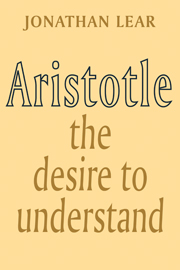3 - Change
Published online by Cambridge University Press: 04 August 2010
Summary
The Parmenidean challenge
Nature, for Aristotle, is an inner principle of change. If we are fully to understand what it is for man to have a nature, we must understand Aristotle's conception of change. This is no trivial matter. For in the intellectual climate in which Aristotle grew up it was not obvious that change was possible at all. As Aristotle said,
The first of those who studied philosophy were misled in their search for truth and the nature of things by their inexperience, which as it were thrust them into another path. So they say that none of the things that are either comes to be or passes out of existence, because what comes to be must do so either from what is or from what is not, both of which are impossible. For what is cannot come to be (because it is already) and from what is not nothing could have come to be …
The reference is obviously to the pre-Socratic Parmenides, and his followers, who argued that change was impossible. For a change to occur, Parmenides argued, something would have to come into existence from a state of non-existence. But from nothing nothing could come to be. But nor can something come to be from something, for something already exists and thus cannot come to be.
- Type
- Chapter
- Information
- AristotleThe Desire to Understand, pp. 55 - 95Publisher: Cambridge University PressPrint publication year: 1988

